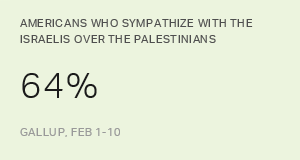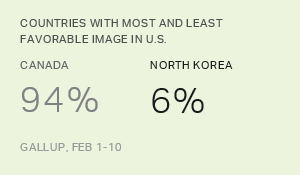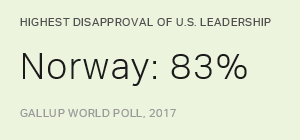Story Highlights
- U.S. sympathies for Israel in Mideast conflict, at 64%, match long-term high
- 74% view Israel favorably, vs. 21% for Palestinian Authority
WASHINGTON, D.C. -- As the Trump administration prepares to move the U.S. embassy in Israel to Jerusalem and is reportedly finalizing its broader Middle East peace plan, Americans' stance on the Israeli-Palestinian conflict is as strongly pro-Israel as at any time in Gallup's three-decade trend. Sixty-four percent say their sympathies in the dispute lie more with the Israelis, tying the high previously recorded in 2013 and 1991.
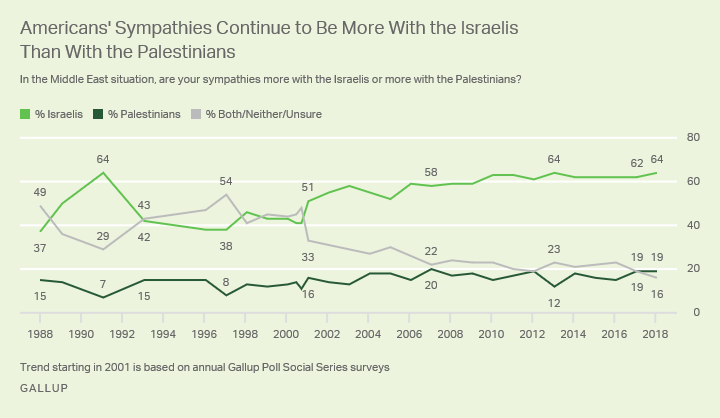
Just 19% of Americans today sympathize more with the Palestinians than with the Israelis, slightly higher than the 15% in Gallup's initial 1988 measurement and ranking among the highest percentages favoring the Arab side of the conflict in Gallup's trend.
Meanwhile, the percentage of Americans who sympathize with neither side, with both sides or who have no opinion about the Palestinian-Israeli conflict is now 16%, the lowest to date. This neutral category has been shrinking as more Americans take positions on the dispute.
Republicans' Support for Israel Climbs Higher
Republicans account for much of the overall increase in sympathies for Israel since 2001, although both Democrats and political independents are also slightly more sympathetic toward the country.
- The percentage of Republicans sympathizing with Israel increased from 59% in February 2001 to 77% in the runup to the Iraq War, and has since crept past 80% on multiple occasions, reaching a new high of 87% this year.
- At 49%, Democrats' preference for Israel is up from 42% in 2001, although similar to the average since then.
- Independents favoring Israel increased from 51% in 2001 to 58% in 2008 and has since held at about that level, registering 59% today.
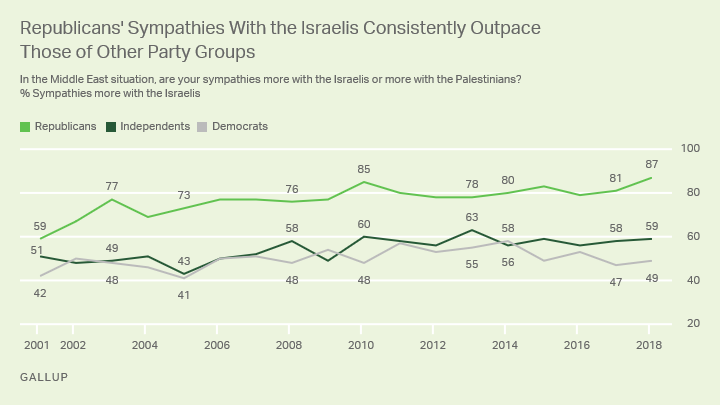
Republicans have consistently shown greater support than Democrats for Israel, partly because of conservative Christians' beliefs about the biblical significance of Israel. Another key factor in the especially wide gap since 2002 is likely Israel's strong backing of the United States at the start of the Iraq War in 2003 and the strong support that Republican President George W. Bush showed for the Jewish state.
Americans Would Lean More on the Palestinians to Make Peace
Americans are about twice as likely to say the U.S. should put more pressure on the Palestinians (50%) than on the Israelis (27%) to resolve the conflict between the two peoples, similar to views in 2013. However, this differs from 2007 and 2008, when Americans were more divided on which side should receive more pressure, and at least 11% volunteered that the U.S. should be putting more pressure on both sides.
U.S. leverage in the Middle East has historically come from its military aid to Israel and humanitarian aid to the Palestinians, as well as its strong leadership role globally. How much leverage the U.S. still has is an open question, given Palestinian leaders' loss of faith in the United States' ability to be an honest peace broker with Israel since the Jerusalem decision, and a recent slide of the United States' international reputation.
Favorable Views of Israel at 17-Year High
Israel and the Palestinian Authority have nearly reverse images in the U.S., further underscoring Americans' partiality for Israel in the Mideast conflict. Currently, 74% of U.S. adults view Israel favorably and 23% view it unfavorably, whereas 21% view the Palestinian Authority favorably and 71% unfavorably.
Israel's current favorable score is the highest for that country since 1991, when its favorable rating spiked to 79% shortly after Iraqi Scud missiles struck Israel during the Gulf War.
Although the Palestinian Authority's image is significantly worse than Israel's, this is the second consecutive year its favorable rating has been above 20%, after six years of readings below that level.
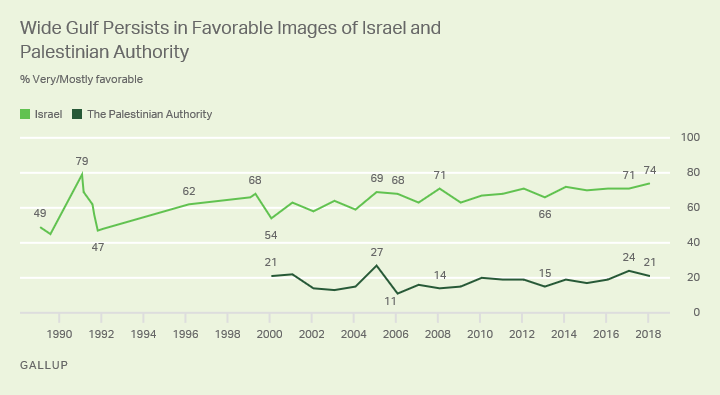
Again, party differences in these attitudes are notable, with Republicans more positive than Democrats about Israel and Democrats more positive than Republicans about the Palestinian Authority.
- 83% of Republicans, 72% of independents and 64% of Democrats view Israel favorably.
- 27% of Democrats, 21% of independents and 12% of Republicans view the Palestinian government favorably.
Beyond party and consistent with Gallup previous findings by age, Israel also receives higher favorable ratings from adults 55 and older (80% favorable) than from those 35 to 54 (72%) or 18 to 34 (65%). Conversely, the Palestinian Authority receives somewhat better ratings from adults 18 to 34 (31% favorable) than from those 35 to 54 (15%) or 55 and older (18%).
Bottom Line
The broad contours of Americans' perspectives on the Israeli-Palestinian conflict remain about the same under President Donald Trump as they've been in recent years. Most Americans view Israel favorably and the Palestinian Authority unfavorably, resulting in a strong tendency for Americans to sympathize with Israel in the territorial conflict and to call for greater diplomatic pressure to be placed on the Palestinians.
These pro-Israel sentiments are particularly strong among Republicans and have been growing in recent years. Thus, to satisfy his political base, Trump's options would seem limited to those that put minimal pressure on Israel over such thorny issues as the status of Jerusalem and the maintenance of Jewish settlements in the West Bank. However, given Trump's past efforts at diplomacy, anything is possible. The current data at least serve as a baseline for evaluating any changes to Israel's and the Palestinians' U.S. images after they respond to whatever Trump and his team propose.
Survey Methods
Results for this Gallup poll are based on telephone interviews conducted Feb. 1-10, 2018, with a random sample of 1,044 adults, aged 18 and older, living in all 50 U.S. states and the District of Columbia. For results based on the total sample of national adults, the margin of sampling error is ±4 percentage points at the 95% confidence level. All reported margins of sampling error include computed design effects for weighting.
Each sample of national adults includes a minimum quota of 70% cellphone respondents and 30% landline respondents, with additional minimum quotas by time zone within region. Landline and cellular telephone numbers are selected using random-digit-dial methods.
Learn more about how the Gallup Poll Social Series works.
